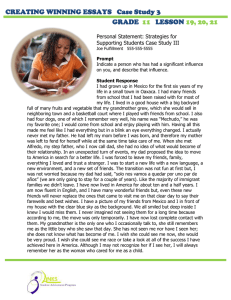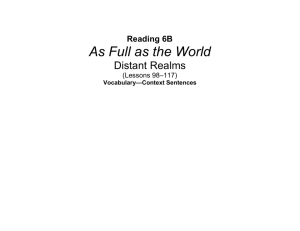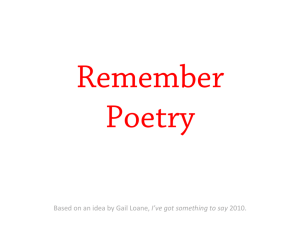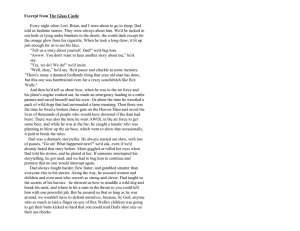MUSE SPRING 2001 CALHOUN
advertisement
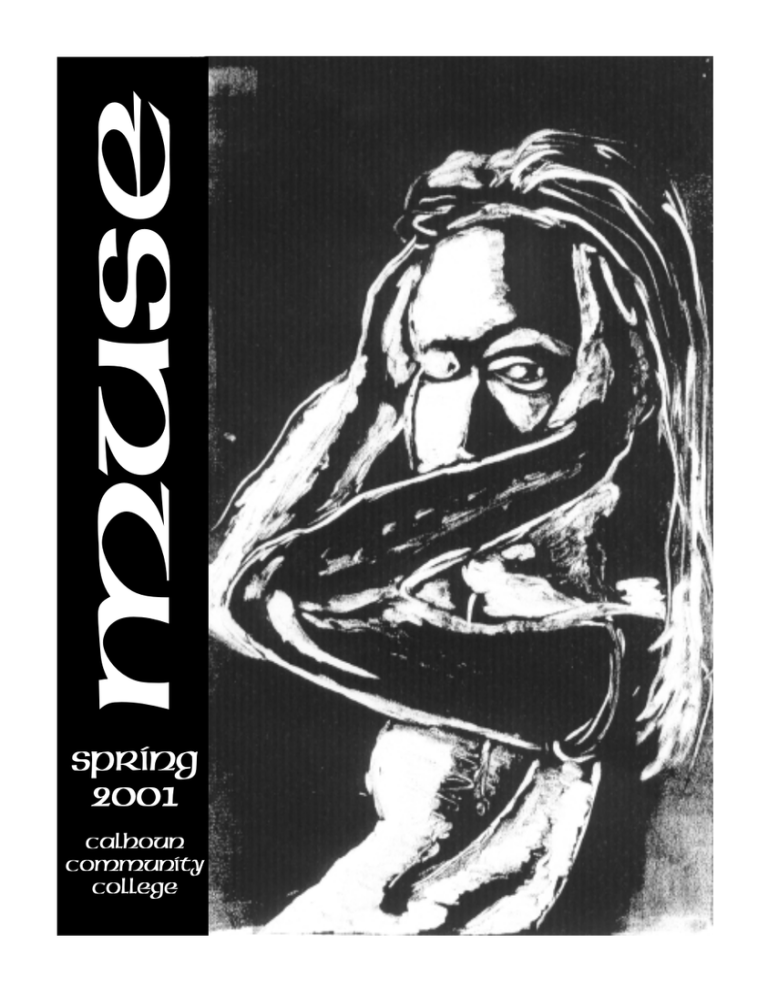
MUSE SPRING 2001 CALHOUN COMMUNITY COLLEGE CALHOUN COMMUNITY COLLEGE Muse Volume XI: Spring 2001 muse: def. muse v. To ponder or meditate; to consider or deliberate at length. 2. To wonder. N. (Greek Mythology) Any of the nine daughters of Mnemosyne and Zeus, each of whom presided over a different act of science. 2. In general, the spirit, or power inspiring and watching over poets, musicians, and all artists; a source of inspiration. 3. (Archaic) a poet. Editorial Committee Cynthia Burkhead Sheila Byrd Stephen A. Calatrello Jill Chadwick Rebecca Haines Harry Moore Beth Thames Cover Art: Brian McClard www.calhoun.cc.al.us/muse 1 Abbey Fields Matthew L. Nolan On a bright Sunday afternoon Abbey stood like a single chess piece on a board made of golden wheat; a queen placed center like a trophy in an abundant field of tall grass bent across the prairie. Wheat tickled inside her white laced dress past her knees which buckled out and pointed her toes in to show her awkwardness of age. Like a bed sheet swept from a clothesline and caught in a breeze that slowly dances and hovers over nature until caught by a twig, tassel, or fence; Abbey glided into the grass with the fullness of her dress hiding a circle of wheat, while her giddy laughter carried her on her side. She peaked through thousands of wheat blades until her eyes met the rough outline of Rockingford’s fence. “I know not that this is the Rockingford Farm,” Abbey whispered to herself. “But the fence does run as far as Daddy said.” Abbey bent up a little and began to creep her way towards the fence, like a soldier advancing and hiding all at the same time. Her black buckled shoes rustled the wheat, parting some and stomping others. A distant shuffle of grass followed by a pause, followed by another shuffle of grass and a pause, stopped her church shoes dead and swung her body forward onto her knees and elbows. Tall grass poked, tickled, and itched ivory skin unprotected from cotton, lace, and stretchy socks. Abbey’s position was still. Three blades of wheat caressed her lips, while a pink wild flower made love to her cheek. Her amber eyes circled in unison like a second hand on a clock. The shuffle of grass grew near. Her body tensed in fear. Heavy breathing unstuck the tassels from her lips. Black appeared through her window of wheat. It was a man. Abbey’s eyes were transfixed on him. The man came with no words. As the man approached Abbey, she remained on her knees and elbows. Fear turned to fearful excitement. Abbey dropped her bottom lip, lowered her head hard to the ground, wrinkled her eyelids tight, and began rooting in the dirt. The man circled her like the perfect statue she was, admiring her lines, texture, and curves. The man lowered himself into a catcher’s stance above her long amber hair that stretched across wheat, tangled like a spider’s web. Abbey’s heart skipped double to his presence. The man took his fingertips and combed the wheat from her amber strands. Abbey, still bent, buried, and on her knees, clinched two fists of wildflowers and pulled them to her breast. The man continued to pluck, pick, and sort grass from beauty until all was removed. Then, with a graceful bow, he bent down and placed a kiss on Abbey’s head. As he lifted up his face to walk away, her amber strands melted from his moist mouth. Only when he turned away and vanished into the wheat field did they leave his lips forever. 2 All That We Do Charity Campbell Oh, to see something new today but instead I watch the same sky see the same river and pass the same trees. Who could be content to do that day after endless day, Is it not the same sky that changes its colors as often as a child changes moods One moment laughing and bright the next drowning us in tears and then serene and blue and the river, the boring river, that flows down the same path encountering billions of people and animals It touches all lands quenching thirsts and soaking toes And the trees that stand in the ground the same as they have everyday since the day they sprouted providing shade for one and a home for another the birth place of millions of different birds. Year after year am I not like these stuck in one thing not realizing all I do? 3 Blue Jay Sue Pumphrey I was sad when I got home today; I’m not sure why that was, but when I saw a baby blue jay splashing feathers to fuzz I smiled and knew today’d be okay. Photo by Angela Bridges-Christa 4 Photo by Nancy Bates 5 BROWN POT ROAST Illustration by Brian McClard Matthew L. Nolan When she goes home tonight she will feel the lump in her throat swell over her simmering pot roast and when she goes to swallow, her pot roast will lodge somewhere in her conscious between guilt and pity Then she will drop her fork to the vision of the hungry crazy boy lying on the street curled up to his brown girlfriend 6 Change Vanessa Rush I once wrote a poem about a woman who stood lonely by the sea, Holding on to nothing but a memory, She was thinking of a love way back when, Remembering the time and what could have been, Yesterday, I looked into the mirror only to see, The woman in the poem was looking back at me, Today I went to the ocean and set it all free, Tonight I smile and give thanks to God above, I give thanks to remember I once was touched by love Photo by Nancy Bates 7 DEATH FOLLOWS CLOSE EVERYWHERE Matthew L. Nolan Country fried steak at a truck stop Roped off blood on a city block Sticky summer nights with a cricket Ribs curl in fright from the knife that fits tight from the city man The trucker forks his country fried steak with milky white gravy dripping off his chin and a bitter red taste on his lips 8 GO Matthew L. Nolan square buildings hot-dog train hot-dog at Yankee Stadium circle faces rectangle bus spoiled hot-dog on street peanut shells at Yankee Stadium Illustration by Brian McClard 9 In the Tennessee Valley John Michael Hampton In the Tennessee Valley, we live a life so fine Whether in winter, spring, fall, or summer time. We love our neighbor and do what’s right But, we still have fun on Saturday night. We play by night and work by day, For none of us can live without our pay. Each region of the valley is special to me Because there are so many things to do and see. In Huntsville, you can find a museum about space With rockets and shuttles, it is a great place. In Decatur, a giant water park is found With rides and pools, fun does abound. In Florence’s Renaissance Tower, you can see Everything that in the valley be. Athens is the home of Bible carvings at Founder’s Hall, And Loggins Town, where they invite “you all”. No matter where in the valley you stay, You will enjoy living, both at night and by day. Photo by Cynthia McKinney 10 Photo by Brian McClard 11 Kitten Sue Pumphrey Thundering pads of paws across floors and furniture fight ever increasing battles with her toys. In soothing softness of fur, purring in rapt radiance, she snuggles up to her real job; she comforts. My fragile spirit soothes until I can go on. Illustration by Brian McClard 12 Little Eyes Amanda Roper Little eyes that watch me, Little mouths that say what I say, Remind daily of the awesome responsibility Placed in my hands. To tell them the things I know, To guide them on their way, To watch them learn and grow, My actions become their play. Little voices that say, “Thank you,” Innocent, giggling smiles, An earnest wave in passing, These are a teacher’s joys. Photo by Cynthia McKinney 13 MESSENGERS By Bette Favor Terry Missives delivered by urgent virgins in data streams That tell of the future from ancient dreams — These are the offers from which we choose, A cast of the die: I win, you lose. The plan of Koran or the toss of I Ching, Cut of the Tarot or stone in sandy ring: Some are right, some are wrong. I know... I read it in the Times, many years ago. Illustration by Brian McClard 14 Mistaken Hero Sue Pumphrey It used to be said, “Opposites attract,” about my parents. I never realized that within me waged my own opposites, for as surely as Mom gave me a love for books and imaginative reading, Dad gave me a curiosity and love for science and facts. People called on Dad to define various scientific topics, so he added genuine humility. His eight children, used to Dad’s complicated explanations, knew that in public Dad tried his best to simplify, and we lived in fear of embarrassment of those times when he couldn’t simplify well enough. One evening at church, someone asked Dad to explain thunder. I worried and squirmed awkwardly in my seat, for I knew Dad needed to be able to explain with simple words about hot, moist air currents colliding with dry, cold air, or worse, something as complicated as air pressure. Nervously, I wiggled and dangled my bruised knees over the edge of the cold, metal folding chair. The room sat in silence, and Dad cleared his throat. Dad’s explanation seemed simple enough, but the room’s stillness stretched on until, filled with doubt, I squirmed again. Out of the quiet, a Maryland accent loudly drawled, “What Roy means is, it’s two clouds bumpin’ theirselves together!” As the room erupted in laughter, I let my breath out and looked around. Dad wiped his eyes in laughter. I felt proud of Dad; he laughed even at the frailty of his intelligence. Dad also answered, with his factual, logical ways, our many questions. On a drive through a dark neighborhood silenced by snow, I leaned up and asked Dad why the snow fell straight into the front of our van, even after the van changed its direction. Slowly the van’s tires crunched to a stop on the snowy road until we heard only the rhythmic whine of the windshield wipers. The snowy flakes all around us, no longer driven straight into the front of our van, fell downward slowly to their soft, silent landings. On Dad drove and on my childhood traveled, but my respect for science and for facts soon began a continual conflict with my sensitive, secretly imaginative childhood ways. One summer afternoon, I went through the woods on my dream horses through twisting trails, over wrinkled roots, and over half buried boulders. Red faced and thirsty from my long, daring adventures, I reined in my horses and happily headed home, where aromas of dinner greeted me. I went into the empty kitchen for a peek at pork chops as they sizzled slowly, at steam as it rose above green beans, and I drank my fill of cool water. When I wandered into the next room, I saw Dad, home from his Navy job unusually tense; every pilot dreaded a tour of duty behind a desk in the nation’s capital. Soon an angry Dad demanded that all eight children line up; someone dropped a raw egg on the kitchen floor and left the mess. No one confessed to the sloppy deed. I had not done it, and my sensitive conscience didn’t let me lie. We didn’t know which angered and disappointed Dad most, someone’s lie or the deed. One by one, Dad asked each child about their recent location; my kitchen visit placed me nearest the messy egg. Dad gathered the facts before him, dismissed the seven others, and spanked me. Up in my top bunk in the dimness of that dismal dusk, my tears fell until my tall, mistaken hero quietly came in. After my spanking, someone else confessed to Dad. He admitted his mistake, and told me how sorry he felt. After he left, I pretended to be snuggled in his arms, wiped my eyes, and warmly wrapped myself in the comforts of my imagination. My Dad loved me, and my sensitive, imaginary ways helped hold my little world together. 15 Photos by Brian McClard 16 Pebbles Sue Pumphrey Once I dropped a pebble into the quiet stillness of the water. As it left its mark it rippled away, off to touch even Photo by Nancy Bates the distant shores. So I dropped a pebble into the pounding, persistent ever churning surf. But it only sank away as it left no mark here or anywhere. Shivering so, I wrapped myself up tighter as I wondered within which pebble was I. 17 Protector Sue Pumphrey Lady cardinal, camouflaged to hide away from those threats which pursue her in the forest, is blending in, Photo by Angela Bridges-Christa in beauty. Lady cardinal, look who’s near to protect you. He conquers, he leads with a flash of brilliance; it’s his armor. Protect her. Oh, that ladies might be protected once again. 18 Sea Glass Sue Pumphrey Sea glass, Sea glass like my dreams of horses, rolling in sea and surf worn down to submission for years, their care and wear by the rougher realities gives a smoothness, leaves a sparkle of logical, factual: to forever remain. sand, surf, father, husband. Ride on in dreams, Sea Glass, Sparkle on in the sunshine of all my days. Sea glass, so scratched, color faded, sparkled with a brilliance when splashed with summertime’s sunlight. Closed eyes, “Names of Horses” tossed and turned into dreams. Photo by Nancy Bates 19 SUMMER SOLSTICE By Bette Favor Terry The summer solstice still is rare To one who has lived so long That few are left to care. Like Houseman’s long ago springs The remains are a too rare song That from English field still rings. The holy day of all that was Druid Revives the life with arcane magic Washed from monolith by earth’s ancient fluid. Photo by Shekira Dodd Sunlight wraps the verdant land in tight glove To reclaim the losses of life so tragic That only this day can give fruition to our love. Photo by Nancy Bates 20 Tennessee Snow Daydream Sue Pumphrey The South tripped me up to fall headfirst into a snowy Tennessee town as a young tom boy, smack dab in the middle of a southern memory. It wasn’t my fault. South, quit! Quit pesterin’ me! I tried to pull loose, but she held on longer. I don’t like you, South! You know that! I gotta go off someday to those millions of acres, out in Montana. It’d be easier to hide from fear in Montana. I shook my head to clear away those thoughts. Now, quit! I pulled free to sit in class again, attentive to the professor. But the southern gentleman’s voice read aloud that story from his past and an assonance of words tripped me up again; my daydream nudged me right into the middle of that memory again as I heard the voice, “I saw fall flakes—.” Saw fall, I jotted it down to remember forever. How can words do this to me? South, what do you want with me? I tumbled down to land in a snowy Tennessee town, a young tom boy again. “Hurry, Randy! It won’t last!” Farris called to his friend, Randy. “Oh, all right, you can come,” Farris told me, “But you can’t get in the way!” I nodded. The rules for tom boys are the same in any state. “Aw, Farris,” Randy said, kicking at the snow, “I don’t wanna be playin’ with a girl!” I grabbed handfuls of snow, and when he turned back to his friend, I hit the back of Randy’s head with a snowball. “Ow!” He came over to me and said, “How come you ain’t throwin’ like a girl?” “God didn’t give me four brothers for nothin’. And I ain’t just a whistlin’ Dixie!” I hurried after them as they walked off further into their southern snow day memory. I called after them but they were getting away, for South tripped me up again. She held me despite my pulls; she questioned me. Okay, South, I’ll think about it. But that’s all! I jerked free and ran off, “I’m comin’! Randy, wait up!” South saw fall feelings for Montana, a notch or two, a start. She’d seen that kind of stubborn anger before; she knew she’d win in the end. South smiled down at me as I tumbled off in my make believe world as a tom boy playing fun and safe games with the boys again. 21 The Pheasant Sue Pumphrey Now doesn’t the pheasant look rather unpleasant with his ludicrous, lofty look? With finery and feathery he sees us as mere peasantry; Photo by Brian McClard he’d be plump and delicious to cook! The Play’s the Thing Sue Pumphrey Elsinore, Denmark, like a friend, in Hamlet’s tale I always tend to flee and seek with lingering look more meaning moving scenes can send. For when I take my Shakespeare’s book words weave me in like baited hook. I see by aslant willow tree broken beauty in weeping brook. Lives are soon o’er; remember me! I feel that same impassioned plea. Young Hamlet’s life’s a twisted quest to set it right, but could there be a path to pass the tangled test without Ophelia to her rest? Father forsook her, though the best, obedient daughter; he’s been blest. Photo by Shekira Dodd 22 Where has the Time Gone? by Amanda B. Roper When I was a little girl, my parents would have to work most Saturday’s, but it was still the best day of the week. My little brother, Cody, and I would wake up early in the morning, and Daddy would drop us off at my Grandparent’s house on his way to work. Their house was a wonderful place to play. Mama’s bedroom had been turned into a playroom where we could play if it was cold or raining outside. In the den, behind Pawpaw’s big chair, a bookshelf was built right into the wall! The bottom shelf was always piled with storybooks with wonderful pictures that we could read whenever we wanted to, or if we said , “Please,” Granny would read to us. Our grandparents were both amazing people. Pawpaw could fix almost any broken toy and make new ones. He could even make his ears whistle! Granny was the best cook in the world! She was a great nurse, too. She could stop any cut or sting from hurting in thirty seconds flat, or make your cold better in one day! Those childhood mornings were the best. When we went in, we always got a big hug even before we said good-bye to Daddy. Then, Granny would give us a plump orange with a dimesized hole cut in the top. It was a wonderful breakfast. We got to take our orange into the den and eat it while we watched the Disney Channel. (Why didn’t we have cartoons with Mickey Mouse on our TV?) We would sit and watch Donald Duck chase Chip and Dale up a tree, while we sipped the juice from our oranges. After the juice was gone, we could pull the orange apart and eat the pulp. We didn’t even get sticky! After the grass had dried, we could go out and play if the weather was good. There was a swing set, a great big ball, several smaller ones, and bicycles that Photo by Cynthia McKinney 23 were just our size! The patio under the big sycamore tree made a perfect house or schoolroom. There was really no end of games that we could play in the big backyard, as long as we stayed out of the garden. It was even better when our cousins came to play. Heather and Leah were great fun, but Derrick was just a baby. When Mama or Daddy came home, we went back to our house. We would eat supper, and either watch a television show or movie together. It was a wonderful time. My, my! Where has the time gone? These things happened only a few short years ago, and yet they seem so far away. Both of our parents have jobs now that allow them to spend Saturday’s with us, but Cody and I are the ones that are gone now. Cody spends most days mowing lawns with Pawpaw Roper, but Saturdays he mows ours or works in his watermelon field. I spend my Saturdays working at the local Fred’s Department Store. The effect of youthful ideas upon childhood memories is quite strange. I realize now that the magic whistle in Pawpaw’s ears was just the sound of feedback from his hearing aids when he folded his ear. I know that Granny never had special healing powers, but that it was her love for us that made our pains go away. However, as I look back on my childhood, I cannot help but think of them in the same way I did then. Were these things ever as I saw them through the eyes of a child? No, my grandparents were never fairy people like you read about in storybooks. My parents were never all knowing or perfect. Nevertheless, they were and are today good people, who will always stand in the far reaches of my memory as the stuff of fairytales. Photo by Nancy Bates 24 Illustration by Brian McClard 25 TONKA DAYS Matthew L. Nolan Garbage gut creeping in my head Frown, folded arms, Tearing corner of fingernail with side of teeth— Isn’t like rolling a metal dump truck through the grass Illustration by Brian McClard 26 Special appreciation for assistance with Muse 2001 goes to the English Department for printing expenses, to Graphic Artist Beth Butler for design and layout, to Lanita Parker for her web expertise, and to Calhoun Print Shop personnel. Current and former Calhoun students are invited to submit poetry, short stories, essays, photography, art, and other creative work to MUSE for possible publication. Work will not be returned, so please retain a copy. Mail work to MUSE, c/o Calhoun Community College, P.O. Box 2216, Decatur, Alabama 35609-2216. For more information, e-mail Stephen A. Calatrello: stc@calhoun.cc.al.us or visit Muse website at www.calhoun.cc.al.us/muse
